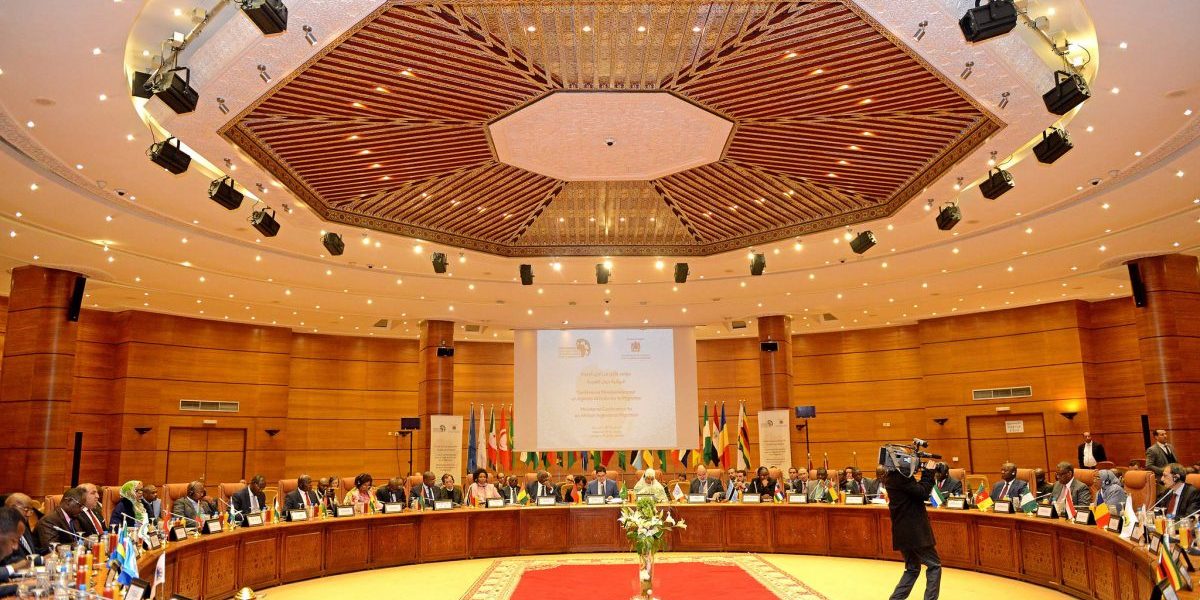While the AU has officially embraced democracy and condemns violent transfers of power, its leadership selection process remains mired in old-guard rules that threaten to destroy the continent’s hard-won credibility.
By convention, the largely ceremonial annual chairmanship of the AU is held by the head of state hosting the AU summit, and is rotated to each of the continent’s five geographical regions. Each region then comes up with a candidate, presumably to prevent perceptions or practices of dominance by any one region.
“The chairman is chosen by rotation among the AU member states. It’s simple as that – no values are attached,” said Prince Mashele of the Institute for Security Studies (ISS), noting that many smaller, poorer states usually decline due to financial burdens.
It was to have been East Africa’s turn in 2006, and the country selected was Sudan. With the Darfur conflict raging and rebels threatening to scupper peace talks in Abuja, AU members narrowly avoided the embarrassment of installing a leader accused of committing grave crimes against civilians.
The deal that brought Congo to the chair only deferred Sudan’s claim to the chairmanship. In a carefully worded declaration, the AU Assembly in January 2006 “agreed after extensive consultation that Sudan will assume the Chairmanship … [in 2007] … reiterat[ing] the importance of implementing the principle of rotation between the geographical regions of the continent.”
With Denis Sassou Nguesso’s term expiring at the end of January, al-Bashir may again accede, unless common sense and last-minute lobbying prevail again. However, instead of agreeing on a set of principles or basic qualifications that a chairman must possess, the AU is stuck with its rotational system.
What has changed in Darfur in the last year? Despite a shaky peace agreement concluded with some rebel groups in May 2006, the region remains unstable, and the conflict has spilled over to neighbouring Chad and the Central African Republic. Sudan disputes widely-quoted figures of 200,000 deaths and over two million displaced persons, citing just 9,000 fatalities. Charges of escalating the conflict, attacking civilians, endangering aid workers, rearming rather than disbanding the Janjaweed militia and protecting war criminals have been laid at Al-Bashir’s door.
This week the AU confirmed that the Sudanese government had again bombed villages in Darfur last week.
At the same time, ambiguity persists over whether Sudan has indeed agreed to accept a hybrid UN-AU peacekeeping force of 22,000 to take over from 7,000 beleaguered African troops, with speculation that Khartoum’s apparent assent was calculated to assure Africans that it still deserved the chairmanship.
Rebels have threatened to target AU forces if Al-Bashir takes over, claiming that he cannot be both combatant and peacekeeper in the same conflict, and that he can hamstring the AU’s operational effectiveness in Darfur. Civil society has again raised protests, as they did in January 2006. The key reasons the AU bypassed Sudan last year persist.
“Selecting Sudan would send an extremely bad message to the world. Sudan is in defiance of the AU, and guilty of extensive human rights abuses. And African states are well aware of this,” said ISS executive director Dr Jakkie Cilliers. He speculated on ways out of the impasse: continuing Sassou Nguesso’s tenure (although he is unwell); deferring Sudan’s chairmanship for a third time; asking East Africa to select an alternative candidate or rotating to another region.
At this point, no alternatives are being openly discussed, but backroom lobbying is likely to be intense.
This conundrum exposes the weaknesses of the African attachment to selection solely by geographical rotation: eventually, problematic regimes will be first in the queue. For example, Africa chose notorious human rights violator Libya to chair the UN’s former Human Rights Commission in 2003, and caused the body to collapse in ignominy.
If the continent is serious about reform and has truly embraced democracy, there should be firmer rules about who occupies symbolically important offices.
Although it will certainly take some nimble diplomatic manoeuvres, Africa cannot afford to allow the reputation of the AU to be shattered by installing the man presiding over one of the continent’s worst humanitarian crises as mediator over that crisis. Then it can get on with the real business of improving Africa.








